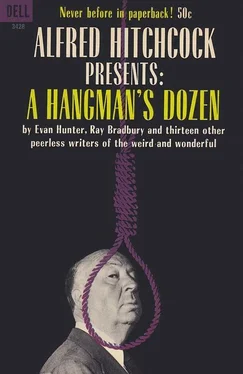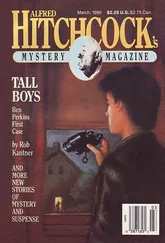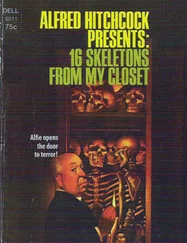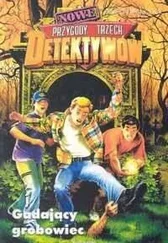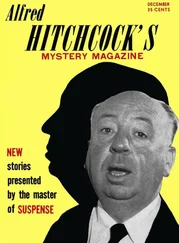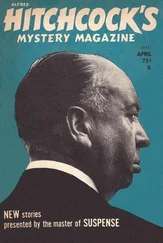There was something diabolical about Arnold in action. Naomi was beginning to realize that. In a few words, he’d turned the prosecutor into an unwitting counsel for the defense. The man sat down, chastened and confused.
Arnold turned back to Henry Babcock.
“Agnes Thompson approached the intersection from the east,” he resumed. “That means that she came from behind you, doesn’t it?”
“Yes, sir,” Babcock answered.
“Yes, because you sat on a bench parallel to a street running north and south. The bench” — Arnold referred to the blackboard again — “is on the southeast corner of the intersection. The signal, which you have testified was red when my client’s automobile struck Mrs. Thompson, is approximately ten feet north of the bench, which would have been to your right as you sat facing the street. Correct?”
Henry Babcock adjusted his glasses and leaned forward to follow Arnold’s indications on the blackboard map.
“Yes, that’s correct,” he agreed.
“And so, you were sitting on the bench, tired after the night’s work.”
“Yes, sir.”
“And alone?”
“Yes, sir.”
“Waiting for a bus to take you home to your apartment where you live alone.”
Babcock’s forehead had corrugated into a puzzled frown, but he answered.
“Yes, sir.”
“You looked at the signal, and saw that it was red.”
“Yes, sir.”
“And before it changed to green, my client’s automobile raced past the intersection, striking down Mrs. Thompson, whom you hadn’t noticed prior to the accident—” Arnold paused, as if only at that instant discovering a flaw in the testimony. “Now, that does seem strange,” he mused aloud. “You turned your head to the right and saw that the signal was red. Why didn’t you also see Mrs. Thompson preparing to step down into the cross-walk?”
There was a slight murmur in the courtroom. Arnold’s strategy was beginning to take hold.
“I don’t know,” Babcock answered. “I guess she wasn’t there yet when I looked.”
“Then you must have looked away from the light for a time.”
Babcock hesitated, sensing a trap.
“The light was red!” he insisted.
“But you didn’t see Mrs. Thompson.”
“It was dark.”
“Isn’t there a street lamp at that intersection? Think, Mr. Babcock.”
“There’s a street lamp, but it only shines so far. After that, it’s dark.”
“And yet Mrs. Thompson would have had to come into that arc of light, wouldn’t she?”
“Maybe she came too fast for me to see her. Maybe she was running.”
“Running?” Arnold caught up the word and dangled it before the ears of the court. “Now, why would she have been running, Mr. Babcock? Haven’t we already established that it was late, very late, and that she must have been weary from sitting up with a sick grandchild?”
Henry Babcock was an uncomplicated man who, very likely, had never sat in a witness box before in his life. He’d come to do his duty, and yet, by answering extemporaneously a few minor questions he hadn’t thought through, he’d gotten himself into trouble. He glanced pleadingly at the prosecutor, who was helpless at the moment, and then got himself into worse trouble.
“Maybe she was afraid.”
“But why should she have been afraid?” Arnold demanded.
“Because it was so late. It’s not safe for a woman out alone at that hour. Things happen. You read about it in the paper all the time.”
Arnold listened carefully to Henry Babcock, so carefully that he caught up the entire courtroom in his attitude and everyone listened, carefully.
“I read about it?” he echoed. “What do I read about?”
The accentuated pronoun forced Henry Babcock to a correction.
“I mean, people do,” he explained. “Anybody.”
“I think what you mean,” Arnold interpolated, “is that you read about it all the time. Now, just what do you read?”
Henry Babcock was perspiring freely. He didn’t bother to wipe his brow.
“Things that happen,” he said. “Robberies, attacks—”
“And you always read about these things, is that right, Mr. Babcock? When you’re all finished bringing coffee to the ladies’ dressing room, and cleaning up the deserted club, you go home to your apartment, alone, and read about terrible things that happen to women who go out on the streets at night—”
Arnold’s voice was an instrument played with professional skill. It was impossible not to be drawn along with it. But he got no farther before the prosecutor was on his feet shouting an objection. Arnold smiled at him with an expression of tolerant patience, and only Naomi understood what was happening. The innocent must always be made to appear guilty. This was Arnold’s secret of success.
“... I don’t want a scene, Naomi. This woman need never have come between us if you hadn’t insisted on a showdown. I’m not planning to divorce you, or to allow you to divorce me. I can’t afford a scandal, and you have the children to consider even if my career means nothing to you...”
The innocent must always be made to appear guilty.
“Your Honor,” Arnold continued, with mock humility, “I’m deeply sorry if my remarks have caused prejudice in the minds of the jury. It wasn’t my intention to infer that the witness has socially undesirable tendencies. Nevertheless, I’m still curious as to how he could have turned his head to observe the traffic signal and not have seen a woman about to step out into the crosswalk. If he was tired, he might have been dozing; but then, he wouldn’t have seen the signal. If, however, he was alert enough to notice the signal, why didn’t he see Mrs. Thompson?”
With these words, Arnold swung back to Henry Babcock.
“Or did you see her, Mr. Babcock?”
Henry Babcock drew back in the box.
“No,” he said.
“Are you sure, Mr. Babcock? A few moments ago you were positive that you didn’t see her; a few moments later you thought that you might have heard her. Now you can’t seem to explain why you didn’t see her. Isn’t it possible that you did see her? That perhaps you spoke to her?”
“No—”
“That you approached her?”
“No! I never left the bench!”
“You never left the bench, and yet, with an automobile approaching, and surely Mrs. Thompson could have seen the headlights, the victim stepped off the curb and into its path. Why did she do that, Mr. Babcock, unless, as you have suggested, she was startled out of her wits? Was there anyone else in the vicinity at the time?”
Babcock was no longer bewildered; he was furious.
“No!” he shouted.
“Then no one could have startled Mrs. Thompson unless it was yourself.”
“I didn’t say she was startled.”
“But you suggested it. You suggested that she might have been running. These are interesting suggestions, in view of the fact that you knew no one other than yourself was in the vicinity. Since you’ve volunteered this much light on the mystery of what happened at that intersection the night Mrs. Thompson died, perhaps, remembering that you’re under oath, you would like to tell the whole truth.”
Arnold waited for an answer, and the court waited with him.
“I told the truth!” Babcock insisted. “The whole truth!”
“Thank you, Mr. Babcock.”
Arnold stepped back. He seemed ready to release the witness; only Naomi knew it was a feint. There had been another telephone call only this morning. She’d overheard enough to know Henry Babcock wasn’t going to get off so easily.
“... Yes, Fran, he’s going to be tough to crack — too clean. Nothing on him unless I can color up that job of his. What? Do you have proof? Good girl! Of course, it’s enough. I’ll make it enough.”
Читать дальше
